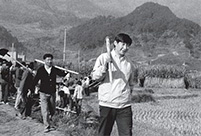 Top 100 beauties in the world!
Top 100 beauties in the world!
 Gallery: Who is the most beautiful one?
Gallery: Who is the most beautiful one?
 If you like autumn, put your hands in the air!
If you like autumn, put your hands in the air!
 Fan Bingbing's "Queen style" in new play
Fan Bingbing's "Queen style" in new play
 Lingerie show at 2014 Miss China
Lingerie show at 2014 Miss China
 J-10 fighters show aerobatic stunts in smog-free sky
J-10 fighters show aerobatic stunts in smog-free sky
 Charming contestants of Shanghai Int’l Model Contest
Charming contestants of Shanghai Int’l Model Contest
 Most amazing chi-pao beauties
Most amazing chi-pao beauties
 7 deadly animal attacks
Russia to launch 70 Proton rockets by 2020: official
7 deadly animal attacks
Russia to launch 70 Proton rockets by 2020: officialBoston, Nov.18 -- On November 18, a laboratory for nutrition research jointly set up by China’s Feihe Dairy, a leading domestic baby formula manufacturer and the Beth Israel Deaconess Medical Center at Harvard Medical School (BIDMC) started operation.
It can be predicted that this international research platform, devoted to upgrade the nutrition level and promote the health of the infants and children in China, will pool the talents from disciplines including digestion, neurology, microbiology, and pediatrics, said Dr. George L. Blackburn, an associate director of the Division of Nutrition at Harvard Medical School who directs the lab, in an interview.
In the U.S., early nutrition has been a hot topic. Prof. Blackburn, dubbed the father of Omega-3 in the U.S. for his outstanding achievements, has been doing research on the topic since 1970s. Now, in his 70s, prof Blackburn wants to spread human nutrition theory to Asian countries, including China, to promote local people’s health through quality nutrition from infants to senior citizens with a focus from cow milk to ewe milk.
It is with this goal that Prof. Blackburn came to China in late October to select a local partner. BIDMC, located in Boston, MA, is one of the leading hospitals of the medical school at Harvard University. Prof. Blackburn is a leading researcher in the BIDMC who dedicated his life to clinical research on nutrition. With his effort, the nutrition research team in the BIDMC has nurtured about 100 top experts and remains one of the leading team in the world.
In recent years, Blackburn’s interest turned again to China, a country that he visited as early as 1973 when he traveled to China as a specialist on the protection of traditional Chinese medicine. In that year, he was in his doctoral fellowship in food nutrition at MIT at that time. He was quite worried that the traditional Chinese medicine, especially herbs, might be lost, he then send specialists to China to support relevant studies from Harvard and asked two of his students to focus on traditional Chinese medicine. In 2008, the melamine incident broke out in China, arousing world’s attention. Learning the baby formula scandal, Blackburn was extremely distressing. He hoped that he could spend time in enhancing the physical fitness of infants and children in China with his expertise on nutrition.
His idea happened to coincide with Leng Youbin, Chairman of Feihe Dairy, who believed baby formula is not simply a branch of food industry. He holds the view that the production of baby formula needs expertise and research and that the level of technology and management should be in line with that of pharmacy. The chairman said only by focusing on science and technology can his company create a special baby formula tailored to Chinese infants.
The cooperation is blessed as Blackburn said he hoped to find an outstanding company in the East, so that with his professional experience accumulated in past decades, he could help to build that company into a world-class one with international standard like Wyeth and Abbott.
On the Feihe side, it has been considering internationalizing its research and development since 2009. The company used to work with European partners, including Arla Foods of Denmark and some major raw material suppliers in Germany. Feihe relied on these foreign research and development institutions to develop its products. But, this kind of partnership did not satisfy Chairman Leng, who wants to have a R&D lab that belongs to Feihe itself and is focused on creating products for Chinese customers.
Leng’s idea won applause from Blackburn who considers Feihe a company with vision and social responsibility. Blackburn believed Feihe is an ideal partner to realize his dream.
After several rounds of discussion, in 2014, the two sides decide to set up a nutrition research lab in Boston. “Rather than focus on applied research like most companies do, Feihe wants to be a vanguard in R&D through the nutrition center with BIDMC,” Leng said. “I believe, a brand can only go global by making its R&D global.”
The center will focus its efforts on research of early nerve, cell and genes.
According to Leng, It’s a joint laboratory, which is built in BIDMC lab at Harvard Medical School. Dr George will be in charge of selecting scientists. Among them, some are his students, and some are very famous figures in the health care industry. There are also some Chinese American, such as Doctor Kong, who focuses on genes. The experts in Feihe will also join the project and the company will send doctoral candidates to the lab. In addition, Feihe’s researchers will work in the lab at regular intervals.
The research of the center will be first conducted in the areas of infant and childhood nutrition. And general health condition from the beginning of pregnancy, to half year after babies are born and that of babies before they turn to three years old will be studied.
Particularly, the research of the lab will be focused on the nutrition needed for brain growth.
Nutrition condition in the period of early pregnancy and infant is vital to a person’s lifelong health, according to Blackburn. Malnutrition at early stage of life will not only lead to physical and mental retardation but also increase the risk of contracting such chronic diseases as cardiovascular diseases, diabetes and hypertension, he said.
Our research will draw on the experience accumulated in the past decades and contribute to improve the fitness and nutrition education for Chinese children, the number of whom surmounts 200 million, Blackburn said.
For this purpose, the center will study the ways to tackle the problem of infantile obesity, improve digestion and enhance intelligence. Efforts will also be made to promote nutrition education in early pregnancy to help future mothers to develop a good habit, according to Blackburn.
Meanwhile, Feihe promises to carry out public activities, including Internet training programs and real-life classrooms, to promote the nutrition education in early pregnancy.
The joint lab’s research will also touch on neurological study because neurology controls organs in human body, Blackburn said.
In addition to nutrition of infants and children, the lab will also pay attention to the health of senior citizens. Feihe has decided to make ewe milk a main product of research for the elderly. It will put more efforts on the industry of sheep in the future. It plan to raise one million sheep, whose milk would be made into product in provinces including Shaanxi, and Jilin, because ewe milk consists of small protein and small fat globules, whose protein are short-chained, which makes it rather easy to be absorbed by old people. The product is aimed to help the elderly cope with digestive problems so that people could live a healthier and longer life, according to Leng, who aims to make Feihe the biggest ewe milk base in the world.
In his visit to China, Blackburn also went to northeastern Heilongjiang Province to study an ecological pasture ground and a model factory of Feihe. He was impressed by the fact that Feihe was the first Chinese company to cover the entire parts of industrial chain.
According to Leng, Feihe has relocated all its bases in south China to the zone of 47-degree north latitude, where the temperature in winter is as low as 40 degrees below zero centigrade. Therefore, it will go through a process of sterilization in winter with all germs being frozen to death. Moreover, the productive dark soil in the area is good for crops like sorghum, which is key to large-scale husbandry.
More importantly, the water in the climatic area is also remarkable, because the PM reading in pasture is stable at 8.5, which means the cows and sheep can keep a balanced take of acid and alkaline.
The selection of geological condition reveals Feihe’s effort to produce best products.
Analysts said the cooperation between renowned BIDMC of Harvard medical school and Feihe, a leading Chinese domestic brand will enable the joint research center to realize Prof. Blackburn’s dream of improving the nutrition quality of infants and Children in China.
Founded in 1962, Feihe Dairy is one of leading producers and distributors of premium infant formula, milk power, soybean, rice cereal and walnut products in China.
 Hot girls at motor show
Hot girls at motor show  Official trailer of Y-20
Official trailer of Y-20 Photos: Xi Jinping in Fujian
Photos: Xi Jinping in Fujian Standard faces for each countries
Standard faces for each countries China-made military transport aircraft gets ready
China-made military transport aircraft gets ready World Pole Dance Championship in China
World Pole Dance Championship in China Shocking! Photos of Chinese fighters revealed
Shocking! Photos of Chinese fighters revealed 59-year-old Liu Xiaoqing still looks stunning
59-year-old Liu Xiaoqing still looks stunning  In pics: PLA stages live-fire drill in NE China
In pics: PLA stages live-fire drill in NE China  Top 10 most dangerous jobs in the world
Top 10 most dangerous jobs in the world  Top 10 fifth generation jet fighters in the world
Top 10 fifth generation jet fighters in the world Top 10 Chinese goddesses
Top 10 Chinese goddesses  Top 20 hottest women in the world in 2014
Top 20 hottest women in the world in 2014 Top 10 pure beauties in showbiz
Top 10 pure beauties in showbiz  Top 10 world's highest-paid models 2014
Top 10 world's highest-paid models 2014 The most gorgeous Chinese women
The most gorgeous Chinese women Top 10 most handsome faces in Asia
Top 10 most handsome faces in AsiaDay|Week|Month